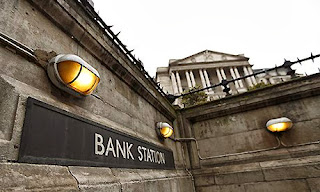Shares and oil prices rise in hope of six-week extension as OECD warns US deadlock threatens world economy
Shares and oil prices rose strongly on Thursday amid hopes that policymakers in Washington were buckling under the global pressure for them to settle their differences and prevent a US debt default.
The International Monetary Fund (IMF) and the Organisation for Economic Co-operation and Development (OECD) both issued sharply worded warnings to Republicans and Democrats amid signs that America's Asian creditors were becoming alarmed at the potential consequences of the impasse.
Reports in Washington that the Republicans would agree to a six-week extension of the debt ceiling from next week's 17 October deadline led to a 323-point rise in the Dow Jones average. Brent crude was up by $2 a barrel and the FTSE rose by 92 points as the Republican leader in the House of Representatives John Boehner said it was time for meaningful talks with President Barack Obama.
After discussions with Republican leaders on Thursday night, the White House said Obama had held a "good meeting" but that they failed to reach an agreement to end the budget crisis despite earlier hopes that a deal may be in sight. Ninety-minute discussions between Obama and Boehner broke up with little apparent progress or press announcement, although there was a marked change in tone on both sides that suggested a deal may still be close.
Speculation about a deal had emerged after Jack Lew, the US Treasury secretary, said there would be chaos if the US defaulted – a message rammed home by IMF managing director Christine Lagarde and the OECD's secretary general Ángel Gurría.
Lagarde said there would be very dangerous consequences for the US economy and elsewhere if the default was not prevented.
She distanced herself from the infighting in Washington, noting: "The IMF does not make recommendations about how, politically, this can be resolved. We don't take a political view. We just look at the economic consequences.
"When it affects the largest economy in the world, we are bound not only to look at the immediate domestic consequences but at what happens elsewhere, so that we can have a dialogue with our members to help them prepare.
"I hope we will be able to look back in a few weeks and say what a waste of time that was. But we have to look at the risks no matter how unlikely they are to materialise."
Lagarde said there were two channels through which a debt default in the US would spread to the rest of the world. "One would be the trade channel, caused by a reduction in economic activity in the US from the third quarter onwards.
"The second would be the financial channel – the result of uncertainty and material issues. We are likely to see volatility, uncertainty and consequences for the rest of the world."
Lagarde said some of the warning signs of stress in financial markets – such as the VIX index of volatility and the price of insuring financial instruments – were flashing. "It's not helping the US to have this uncertainty and protracted way of dealing with fiscal and debt issues."
Gurría said: "The current political deadlock in the US is needlessly putting at risk the stability and growth not only of the US but also the world economy."
He added there was a risk that the west could be plunged back into recession by a default. "If the debt ceiling is not raised – or, better still, abolished – our calculations suggest that the OECD region as a whole will be pushed back into recession next year, and emerging economies will experience a sharp slowdown. The magnitude of further possible negative feedback effects can only be guessed at."
The ongoing political impasse in Washington has sparked fears the US could default on repayments of its bonds, prompting banks and clearing houses to take preventative measures against such an unprecedented event.
In Hong Kong, the body which stands behind trades on the Hong Kong futures and options exchanges has concluded that some US Treasury bonds posted as collateral are more risky than in the past.
The US government needs to be able raise the nation's $16.7tn (£10.5tn) debt ceiling on 17 October otherwise it might not be able to make payments on bonds it has issued in the past, unleashing turmoil in the financial markets. About $120bn of debt needs to be repaid that day with another $200bn before the end of the month.
"Participants should make necessary funding arrangements to cover any shortfall to their margin requirements resulting from the increase in the US Treasuries haircut [discount]," the clearing house, Hong Kong Exchanges & Clearing, said.Neil Shearing, chief emerging markets economist, at Capital Economics said: "This is uncharted territory. Depending on the scale of default and the response of policymakers, regulators and the ratings agencies, substantial financial market dislocation could follow."
Article Source : http://www.guardian.co.uk
Azure Global’s vision is to be widely recognized as a reputed firm of financial business advisors, achieving real growth for ambitious companies and to become the first choice for F&A outsourcing for accountancy practices and businesses alike and if u want to Setup ur business in United Kingdom then its not difficult in this modern age for more info visit our site Azure Global and join us also On Facebook


